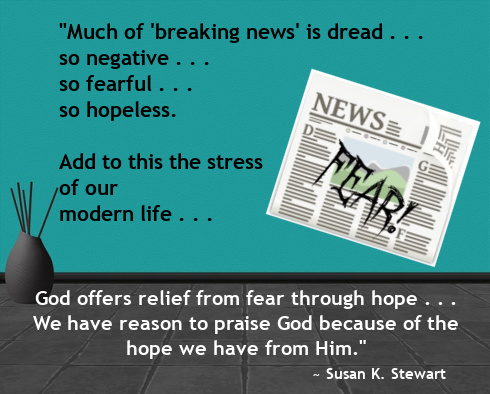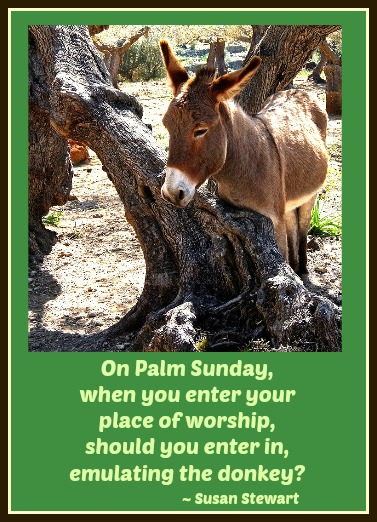Release Fear to Hope
Susan Stewart is a woman of the Word, and a practical, realistic optimist. In this Hope UPGRADE, she points us to many scriptures that will help us release our fears and move to a solid position of hope in the Lord.
Susan says, “An Inuit saying is, ‘We don’t believe. We only fear.’ Sadly, I think this is what our society has come to.”
I (Dawn) believe there are many ways to conquer fear, but hope in God is certainly one of them. (Depending on the Bible translation, the word "hope" appears anywhere from 133 times to 244 times!) I love how Susan zeroes in on this powerful truth.
Susan continues . . .
I don’t read or listen to “news” much anymore. Much of “breaking news" is dread rather than information: deadly storm coming, inflation going to rise, more people hospitalized. I even saw one headline stating, “Life Gets Hard.”
So negative . . . so fearful . . . so hopeless.
Add to this the stress of our modern life: jobs, kids’ activities, commutes, etc. The fearful news only adds to our everyday tension.
Scientists say fear is natural and can be healthy. As one psychologist said, it’s fear that causes us to jump off a railroad track when a train is coming. Fear can be important to our survival.
But the constant state of fear with associated anxiety disrupts our lives and, in extreme cases, our health. Sadly, even Christians succumb to the fear.
God doesn’t abandon us to fear and stress. Instead, he’s provided about 365 Bible verses about fear—one for each day of the year.
Of those 365, more than 100 verses tell us to “fear not.”
Recognize the Bad Kind of Fear
It’s usually not hard to recognize the bad kind of fear, and for those cases, God’s Word tells us to NOT fear—to choose to stand against it.
- "For God has not given us a spirit of fear, but of power and of love and of a sound mind" (2 Timothy 1:7 NKJV).
- "Fear not, for I am with you; be not dismayed, for I am your God; I will strengthen you, I will help you, I will uphold you with my righteous right hand" (Isaiah 41:10 NKJV).
- ". . . In God I have put my trust; I will not fear. What can flesh do to me?" (Psalm 56:4 NKJV).
- "So we can confidently say, 'The Lord is my helper; I will not fear; what can man do to me?'" (Hebrews 13:6 ESV).
When I read these verses, I learn God doesn’t give me fear. Because he is my God, he will strengthen and help me. I have no reason to be afraid. He is holding me.
When I trust God, what can others do to me? After all, who’s in charge here? God is.
Practice Good, Wisdom-based Fear.
God also gives us specifics about good fear. As Job says, “. . . Behold, the fear of the Lord, that is wisdom. . .” (28:28). Again, we have a choice.
- ". . . it will be well with those who fear God. . ." (Ecclesiastes 8:12 NKJV)"
- ". . . Fear God and keep his commandments, for this is the whole duty of man" (Ecclesiastes 12:13 ESV).
- ". . . Only fear the LORD and serve him faithfully with all your heart" (1 Samuel 12:24 ESV).
- "You who fear the LORD, trust in the LORD! He is their help and their shield" (Psalm 115:11 ESV).
- "The LORD is my light and my salvation; whom shall I fear?. . ." (Psalm 27:1).
I hear the loving Father say,
“Fear only me, that’s your duty. I’m your help, shield, light and salvation. Who should you be afraid of? Because you fear me and only me it will be well with you.”
Rejoice in Hope, the Source of Godly Fearlessness
God offers relief from fear through HO. He’s given us more than 100 verse about hope.
- ". . . your faith and hope are in God" (I Peter 1:21 ESV).
- "Let us hold fast the confession of our hope without wavering, for he who promised is faithful" (Hebrews 10:23 ESV).
- ". . . Hope in God; for I shall again praise him, my salvation. . . " (Psalm 42:5, 11 and again in Psalm 43:5 ESV).
- ". . . we rejoice in hope of the glory of God" (Romans 5:2 ESV).
God tells me in these few verse our hope is in Him. We can count on that hope because He promised, and He is faithful to keep those promises.
We have reason to praise God because of the hope we have from Him.
Job uses the word hope at least 25 times. If Job can have that much hope, why can’t we?
One of my favorite old hymns says, “My hope is built on nothing less than Jesus’ blood and righteousness.”
No matter how bleak the world may seem, or news announcements may make it appear, we Christians have nothing to fear.
We have the hope of Jesus in all things.
We can say with the angels, “. . . Fear God and give him glory” (Revelation 14:7 ESV).
What do you fear? How do you fight your fear? Where do you go for hope in a dreary world?
 Susan K. Stewart, Managing Editor with Elk Lake Publishing, teaches, writes, and edits non-fiction. Susan’s passion is to inspire readers with practical, real-world solutions. Her latest book, Donkey Devos:
Susan K. Stewart, Managing Editor with Elk Lake Publishing, teaches, writes, and edits non-fiction. Susan’s passion is to inspire readers with practical, real-world solutions. Her latest book, Donkey Devos: Listening When God Speaks, is a devotional based on life with her donkeys. You can learn more at her website www.susankstewart.com.
Listening When God Speaks, is a devotional based on life with her donkeys. You can learn more at her website www.susankstewart.com.
Graphic adapted, courtesy of Open Clipart / Vectors and Dorothe, Dark Moon Art, both at Pixabay.
 Post a Comment → Posted on
Post a Comment → Posted on  Friday, September 29, 2023 at 2:57PM
Friday, September 29, 2023 at 2:57PM  Fear,
Fear,  Hope,
Hope,  Hope Scriptures,
Hope Scriptures,  Hope in God,
Hope in God,  Hope in Jesus,
Hope in Jesus,  Release Fear,
Release Fear,  Susan K Stewart,
Susan K Stewart,  Susan Stewart,
Susan Stewart,  Upgrade with Dawn Upgrade Your Life
Upgrade with Dawn Upgrade Your Life  Hope
Hope 













